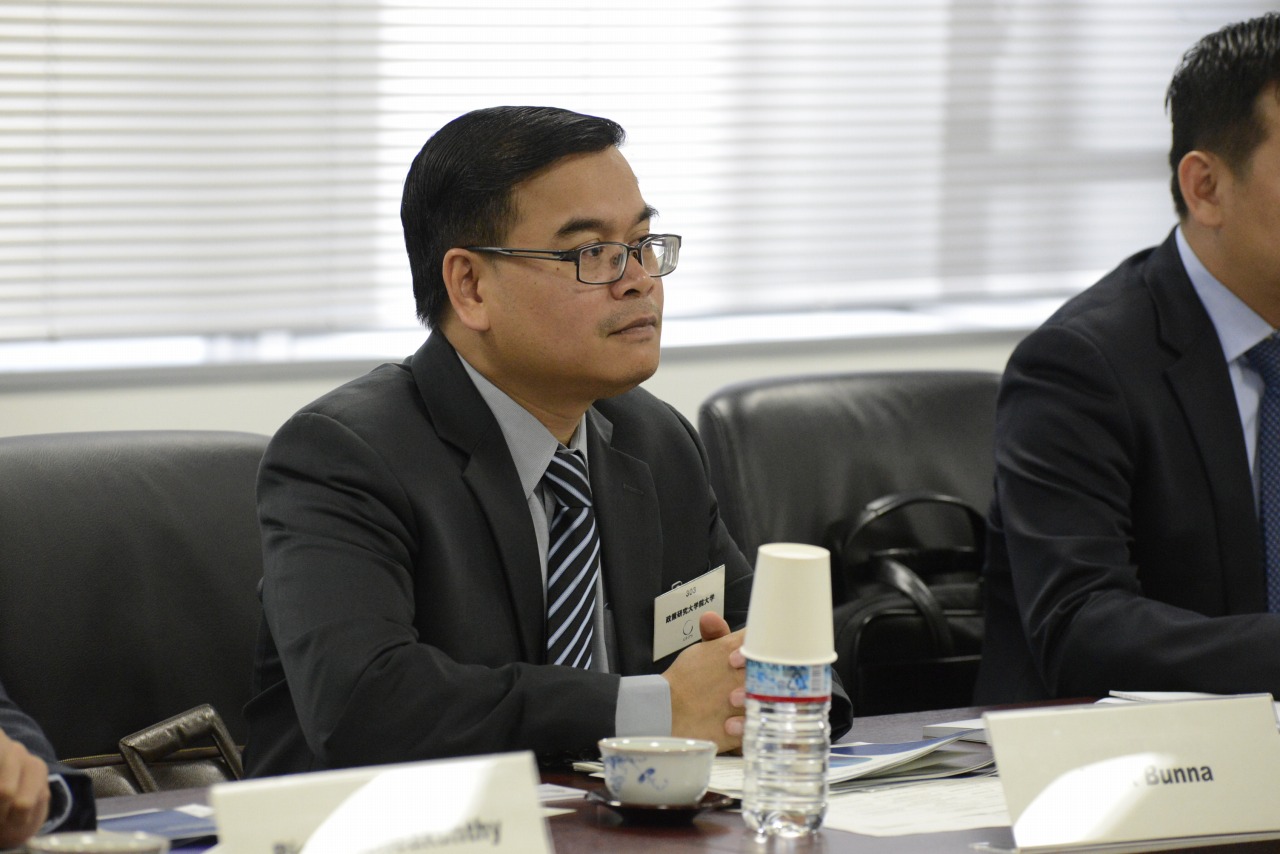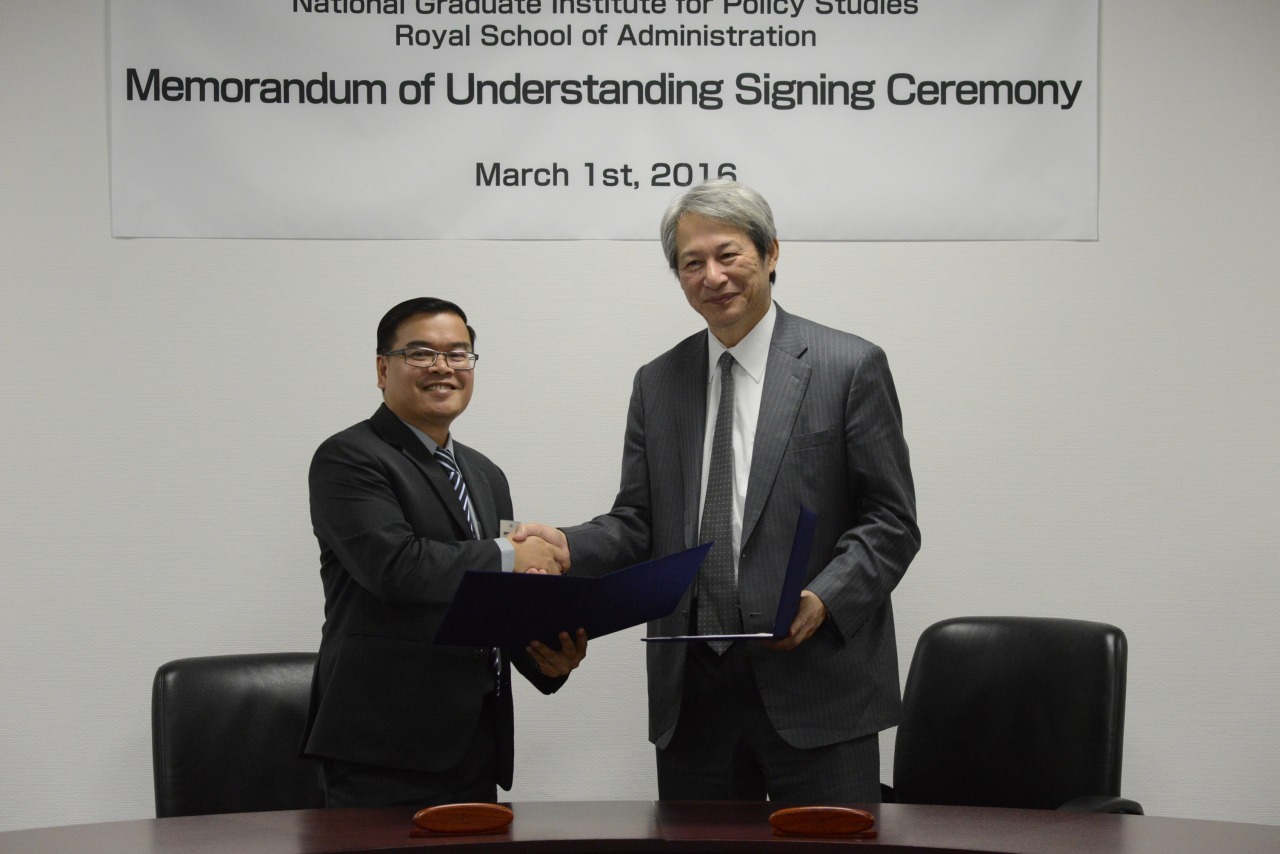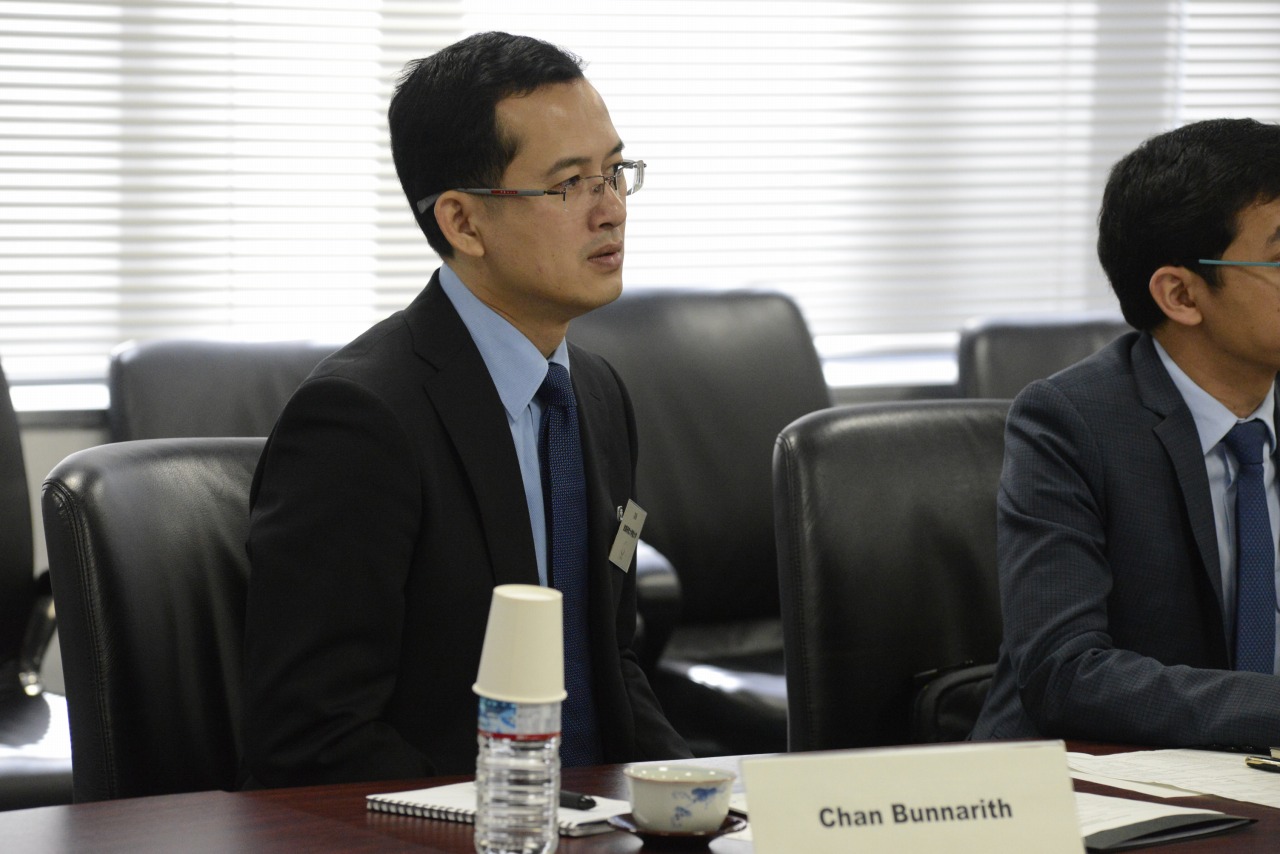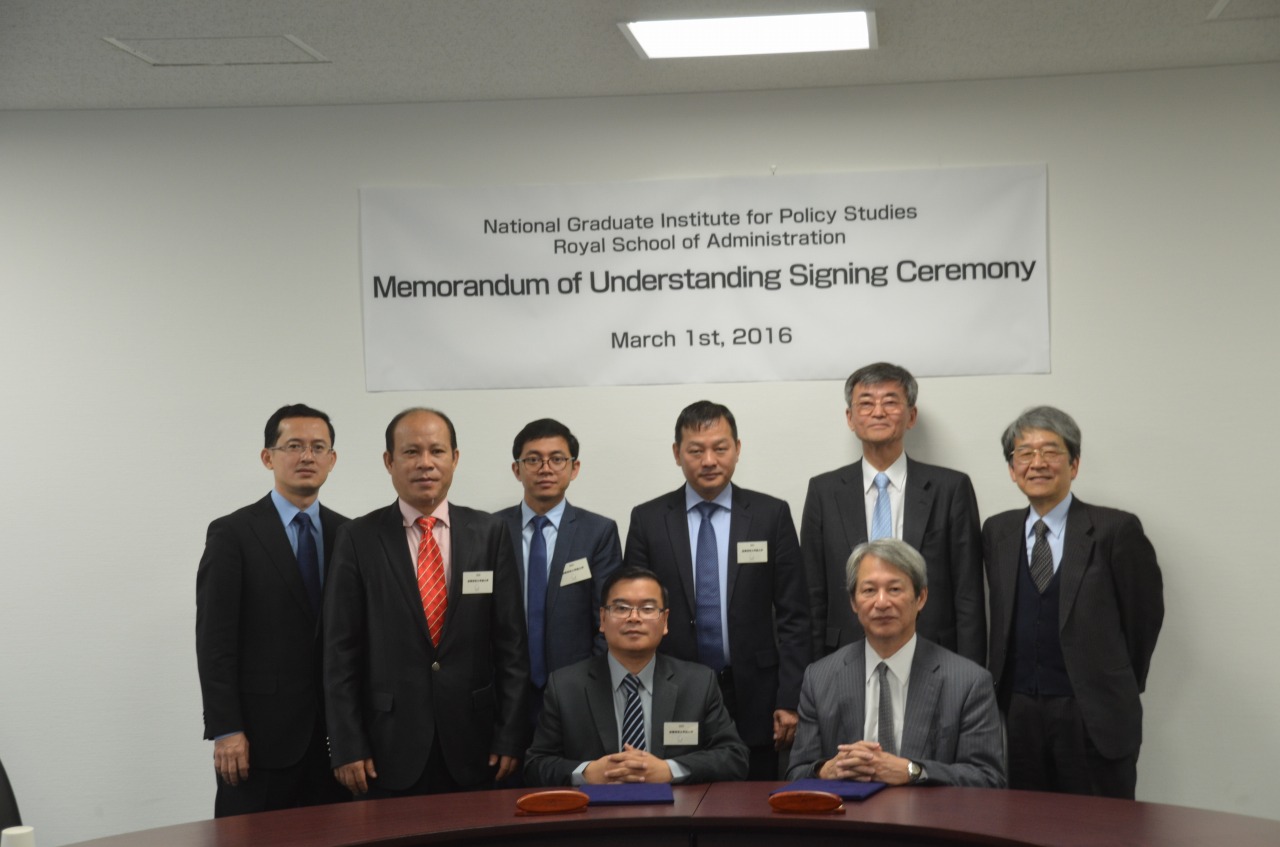News Archives
2016.3.1
Renewal of MOU for Academic Collaboration between the Royal School of Administration of Cambodia and GRIPS
On March 1st, 2016, the Memorandum of Understanding for Academic Collaboration between the Royal School of Administration of Cambodia (RSA) and GRIPS was renewed. A five-member Cambodian delegation, including one GRIPS alumnus, visited GRIPS to attend the signing ceremony.
At the signing ceremony, the representatives discussed their expectations regarding the MOU. Each side explained their institution’s vision and objectives regarding education for public officials, and the two institutions firmly agreed to promote academic collaboration and exchange through activities such as short training programs, executive training, student exchanges and collaborative seminars.
GRIPS PR Division staff interviewed His Excellency Youk Bunna, Secretary of State of Cambodia’s Ministry of Civil Service, and Director of the RSA. Talk centered around the opportunities presented by the MOU and current issues related to Cambodian government reform and capacity building for Cambodian officials. The following is the text of the interview.
1. The MOU between GRIPS and the Royal School of Administration was initiated 3 years ago, and we are currently renewing that agreement. Could you tell us about your expectations of future collaboration with GRIPS?
“There is considerable opportunity for fertile collaboration here, since GRIPS and RSA have similar mandates related to the training of public officials. Thanks to GRIPS’ sharing of its resources, RSA has been able to strengthen its own capacity and that of its staff.”
“On the other hand, GRIPS and RSA are the central training agencies in their respective countries, so it would be valuable if GRIPS and RSA were to conduct staff exchanges for the purpose of sharing knowledge and experiencing each other’s reality.”
“RSA received a mandate from the government to support various governmental reforms, and now we are expected to provide executive training courses for our middle and upper level officials. GRIPS has a strong reputation as an institution specializing in policy studies, and as Professor Masahiro Horie, the Director of the Executive Development Center for Global Leadership, said, GRIPS has been conducting short term executive training courses. Thus GRIPS’ accumulated wisdom in that area would be very useful to us in our work to strengthen our institutional capacity and enhance the capabilities of our staff. As well, since GRIPS has been working with JICA in joint research programs, the Administrative Civil Service and RSA are very glad to be involved in this exchange program.”
2. Our Young Leaders Program is the most popular with our Cambodian students. We have around 80 alumni from Cambodia and currently there are 9 Cambodian students at GRIPS. What do you think attracts Cambodian students to GRIPS rather than other foreign institutions? What do you expect students to learn at GRIPS and take back to Cambodia?
 “Since Japan and Cambodia have been building a close relationship for some time now, our Cambodian staff are well acquainted with Japanese culture and development history, and are conscious of the strong reputation of GRIPS. The record is clear: Cambodian officials who come to study at GRIPS take intensive training and when they return to Cambodia, they perform better and are capable of a greater contribution to Cambodian administration management and government policy formulation. For example, Ms. Nguon Sokha, the former deputy director general of the National Bank of Cambodia, has been promoted to Secretary of State of the Ministry of Economy and Finance. Such success stories are one reason why students want to join GRIPS programs.”
“Since Japan and Cambodia have been building a close relationship for some time now, our Cambodian staff are well acquainted with Japanese culture and development history, and are conscious of the strong reputation of GRIPS. The record is clear: Cambodian officials who come to study at GRIPS take intensive training and when they return to Cambodia, they perform better and are capable of a greater contribution to Cambodian administration management and government policy formulation. For example, Ms. Nguon Sokha, the former deputy director general of the National Bank of Cambodia, has been promoted to Secretary of State of the Ministry of Economy and Finance. Such success stories are one reason why students want to join GRIPS programs.”
3. Cambodia’s Minister of Civil Service visited Japan to observe the workings of the Japanese civil service and to identify ways to improve Cambodia’s civil service. I believe you were the one of the delegates. I heard that you mentioned that you found Japanese human resource management to be very rigorous and efficient. In terms of human resource management and development of Cambodia, what progress has been made, and what are the remaining challenges and obstacles?
“Cambodia is developing, and at present it’s becoming a lower middle income country. We have enjoyed economic growth of approximately 7% per year during the last decade. As you know, the Cambodian government has been making year by year efforts to build a civil service system. For example, we have been working to increase civil servant salaries and we have been making an effort to professionalize our staff. We are also enhancing the staff management capacity of government institutions at the national and subnational levels. Now the government has the flexibility to grant staff management autonomy to subnational institutions. All of these reforms are in place. As for capacity building for civil servants, we are offering continuing short, medium and long term management training, and we introduced an IT system for staff management so we could institute salary payment through commercial banks. We have worked to rationalize civil servant numbers to reinforce the organizational structure. Honestly, we are very proud of our achievements so far; our development partners, the private sector, and the NGOs have also praised that point. The prime minister recently spoke publically about his satisfaction with the reform led by the Ministry of Civil Service to improve the civil service system of the country.”
“However, we still face challenges, as is normal in developing countries. Also, as we move forward step by step, new challenges emerge in the course of the reform. We have noticed that the society’s demands on the government are increasing, as modern lifestyles require better service delivery. I feel that demand is changing faster than the government can respond. This is our main challenge, and we lack the human and financial resources to meet it. In that light, we have to improve our administrative capacity. We also face competition regarding service delivery: domestic competition with the private sector, and competition with other Asian countries. People seeking services now look at the situation in neighboring countries such as Thailand, Malaysia and Singapore, though not yet Japan. This competition puts pressure on the administration, and we have observed that at times we cannot adapt very well to that pressure.”
The period of the renewed MOU between RSA and GRIPS is 3 years, after which it will be open to review once again.
Article by Public Relations Division








